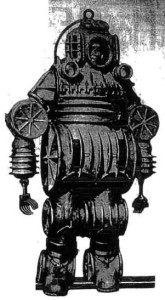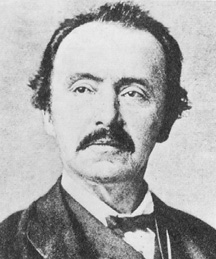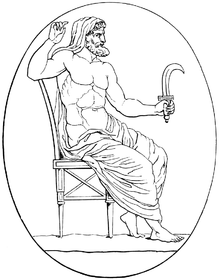Paul Schliemann
Ferla, Mario La
Mario la Ferla is the author of L’uomo di Atlantide[1081] in which he investigates the ‘suspicious’ death  and its aftermath of Spyridon Marinatos on Santorini(a). In fact, he bluntly referred to the death as an assassination (assassinio).He has also written a sympathetic paper on Zangger’s theory that identifies Atlantis as Troy(b). I was disappointed that Ferla appeared to accept the claims of Paul Schliemann as factual rather than the crude hoax that they were.?
and its aftermath of Spyridon Marinatos on Santorini(a). In fact, he bluntly referred to the death as an assassination (assassinio).He has also written a sympathetic paper on Zangger’s theory that identifies Atlantis as Troy(b). I was disappointed that Ferla appeared to accept the claims of Paul Schliemann as factual rather than the crude hoax that they were.?
(a) Mario La Ferla nel Mondo greco (archive.org) (Italian) *
(b) Troia – Atlantide (archive.org) (Italian)
Pätznick, Jean-Pierre
 Jean-Pierre Pätznick is a French Egyptologist who is due to address a conference in May 2015 with the theme of L’Atlantide et l’Égypte (Atlantis and Egypt). His own paper is entitled Atlantis and the Land of the Pharaohs: Egyptian origin of the myth?
Jean-Pierre Pätznick is a French Egyptologist who is due to address a conference in May 2015 with the theme of L’Atlantide et l’Égypte (Atlantis and Egypt). His own paper is entitled Atlantis and the Land of the Pharaohs: Egyptian origin of the myth?
I’m given to understand that Pätznick was influenced by the theories of the late Michael Hübner.
In August 2020, Thorwald C. Franke drew attention to a recent article by Päznick in the French Egyptological magazine Pharon (No 41)(b). Franke has written a review of the article (in English)(a) , expressing overall disapointment with its content.
Päznick now appears to favour Spain and/or Morocco as the location of Atlantis?
>In March 2024, Pätznick’s credibility came under attack by Jason Colavito because of his attempt to rehabilitate Paul Schliemann, who perpertrated a famous Atlantis hoax in 1912(c).<
(a) https://www.atlantis-scout.de/atlantis-paetznick.htm
(b) (99+) (PDF) Atlantis: ‘Lost in Translations’ – In Search of the Egyptian Version | Jean-Pierre PÄTZNICK – Academia.edu (French with English translation available)
(c) Vol.24 – Issue 13 -March 24, 2024 *
Critical Thinking *
Critical Thinking is the only way forward in the pursuit of truth whether it is in respect of Atlantology or any other area of interest. It’s an unfortunate aspect of our nature that we humans seem to believe all too quickly what we want to believe rather than what can be demonstrated. This is particularly true in the case of religious faith as well as ‘fringe’ beliefs such as astrology, tarot cards or channelling. It also applies to more secular matters like politics or even controversial subjects including the existence and/or nature of Atlantis.
Atlantis has spawned a virtually endless collection of outlandish theories, each of which has its believers. Plato’s island has been variously claimed to have been founded by aliens, located at both poles, had flying machines, electricity and monorail transport and this is just a few of the more entertaining claims.
The application of critical thinking(a)(b) to any of the above suggestions would expose them for the falsehoods they are. However, keep in mind what Lenin said – “A lie told often enough becomes truth.” An example of this is the repetition to this day, a century later, of the fraudulent Atlantis claims of Paul Schliemann, long after they were exposed as untrue(c). As recently as 2017 Schliemann’s lies were still being quoted as facts(e)(f).
Also consider, a 2016 large-scale study(d) which concluded that “The results don’t prove that relatively poor analytical thinking skills cause people to become believers in psychic phenomena, but they are certainly consistent with the idea that a lack of these skills may leave people more prone to developing such beliefs.”
(a) http://www.criticalreading.com/critical_thinking.htm
(b) Exploring the Unknown: Introduction (archive.org) *
(c) https://eden-saga.com/en/flood-deluge-atlantis-prevision-genetics-refuges-saved-from-waters.html
(d) Why do so many people believe in psychic powers? – Research Digest (archive.org)
(e) https://www.facts-are-facts.com/article/lemuria-the-lost-continent
Pino, Chavelier
Chevalier Pino was given as the name of the designer of a suit of ‘underwater  armour’ to be used by an English expedition to search for Atlantean treasure. This was announced on the front page of the New York American, October 20, 1912, which also printed Paul Schliemann’s fraudulent Atlantis story(a). I am not aware of any such English expedition, can find no trace of a ‘Chevalier Pino’ and consider the design of the ‘armour’ a fantasy, as is the accompanying Schliemann account.
armour’ to be used by an English expedition to search for Atlantean treasure. This was announced on the front page of the New York American, October 20, 1912, which also printed Paul Schliemann’s fraudulent Atlantis story(a). I am not aware of any such English expedition, can find no trace of a ‘Chevalier Pino’ and consider the design of the ‘armour’ a fantasy, as is the accompanying Schliemann account.
It may be relevant that New York American was a Hearst newspaper, which engaged in circulation wars that often involved the use of sensationalist stories of questionable veracity!
Durant, William James
William(Will) James Durant (1885-1981) was a renowned American  philosopher and historian. In 1968 Will and his wife Ariel won the Pulitzer Prize for non-fiction. He is probably best known for his eleven volume work The Story of Civilisation published over a forty-year period, which is now available as a series of pdf files(b). There is also a website devoted to his work(a).
philosopher and historian. In 1968 Will and his wife Ariel won the Pulitzer Prize for non-fiction. He is probably best known for his eleven volume work The Story of Civilisation published over a forty-year period, which is now available as a series of pdf files(b). There is also a website devoted to his work(a).
In the first volume of The Story of Civilisation Durant claimed that Heinrich Schliemann “believed that Atlantis had served as a mediating link between the cultures of Europe and Yucatan, and that Egyptian civilization had been brought from Atlantis.” However, I would suggest that this statement be treated with caution as it may have stemmed from the Paul Schliemann hoax perpetrated just a few decades earlier
(a) See: https://web.archive.org/web/20130103092851/https://www.willdurant.com/home.html
(b) https://archive.org/details/TheStoryOfCivilizationcomplete/page/n0
Chronos (t)
Chronos in Greek mythology is considered the personification of time, giving us words today such as chronology, chronometer, and chronicle. Chronos is not to be confused with the Titan, Kronos, father of Zeus. Paul Schliemann in his fraudulent Atlantis story erroneously refers to King Kronos of Atlantis, a canard frequently repeated by later writers. Charles Berlitz relates[0743.115 how Chronos was considered by some legends to be the last king of Atlantis.
Schliemann, Paul
Paul Schliemann was the self-declared grandson of Heinrich Schliemann the discoverer of Troy. He was at the centre of an early Atlantis hoax in 1912 when he declared in a New York newspaper article that he had inherited, from his grandfather, artefacts made in Atlantis. He claimed to have ancient documents describing the destruction of Mu and insisted that the Azores were a remnant of Atlantis and that Troy had been a colony of Atlantis. For good measure, he informed the world that the Atlanteans fully understood electricity and had aircraft and power-driven ships. All of which reminds me of some of the later claims of Edgar Cayce!
Additionally, he claimed to have solved the Atlantis mystery after studying the Mayan Troano Codex in the British Museum. Unfortunately, the Troano Codex was housed in a museum in Madrid where it still resides. A further mistake by Paul was to claim that his grandfather referred to the Lion Gate at Mycenae on Crete, when in fact it was situated on mainland Greece. These errors were compounded by his reference to Atlantean coins which is completely anachronistic as coinage only came into use in Lydia around the time of Solon.
Heinrich Schliemann’s collaborator, William Dörpfeld, testified that although Schliemann had occasionally referred to Atlantis, he was unaware that he had made any serious study of the subject or had written anything about it.
Furthermore, Heinrich actively sought publicity and it would have been completely out of character for him not to have claimed the glory for himself of having discovered Atlantis.
Despite all this, the story was widely quoted and is still accepted as reliable by some writers. The full story is now available on the Internet(a).
I recently discovered an article(b) in The Mail of Adelaide in South Australia of February 28th 1925, which in turn was quoting an unnamed San Francisco source, purporting to be based on an interview with Paul Schliemann, ‘son’ of the late Heinrich promoting a forthcoming book on his search for Atlantis. This was a clear attempt to extend the 1912 hoax, but was not spotted by The Mail, considering the amount of space that they allocated to the article as well as the accompanying images.
Egerton Sykes wrote an extensive article about Paul Schliemann’s claims, adding further questions that needed to be answered(c). In 1966, Sykes wrote that Paul had died during World War I, and that his widow later married Panagis Tsaldaris, who became Prime Minister of Greece(d) (This is doubtful – TO’C). Nevertheless, as late as 1974, Sykes was still accepting Schliemann’s 1912 claims as credible(e).
Less than a decade later Marjorie Braymer devoted a short chapter of her book Atlantis: The Biography of a Legend [198.72] to a more critical review of the Paul Schliemann episode, concluding with “The whole story had struck the more reflective Atlantologists as being much too good to be true. The fact is that Heinrich Schliemann did not have a grandson named Paul” and the artefacts never materialised!
>>In 2001, Atlantis: Beyond the Pillars of Hercules, a novel based on the claims of Paul Schliemann, was published by Cy Wenberg. This is not to be confused with the non-fiction book with the same name [1954] written by Peter Heller. Other authors have used the same title without the ‘Atlantis’ prefix. The most important of which [221] was by Rhys Carpenter a former Professor of Archaeology.<<
Also see: Chevalier Pino
(a) https://www.sacred-texts.com/atl/hif/index.htm
(c) Atlantis, Vol.4, No.5, January 1952 & Atlantis, Vol.11, No.2, January 1958
(d) Atlantis, Vol.19, No.4, July/August, 1966
(e) Atlantis, Vol.27, No.4, July/August, 1974
Schliemann, Heinrich
Heinrich Schliemann (1822-1890) and Sir Arthur Evans famed as the discoverers of Troy and Knossos respectively are sometimes  claimed to have believed in the existence of Atlantis. John Michell quotes [0704.200] the following from Schliemann; “I have come to the conclusion that Atlantis was not only a great territory between America and the west coast of Africa, but the cradle of all our civilisation as well.” This extract is from a letter that was allegedly given to his grandson, Paul Schliemann. However, the letter in question was just part of a larger hoax perpetrated in 1912.
claimed to have believed in the existence of Atlantis. John Michell quotes [0704.200] the following from Schliemann; “I have come to the conclusion that Atlantis was not only a great territory between America and the west coast of Africa, but the cradle of all our civilisation as well.” This extract is from a letter that was allegedly given to his grandson, Paul Schliemann. However, the letter in question was just part of a larger hoax perpetrated in 1912.
Although Schliemann is credited with the discovery of Troy at Hissarlik in Turkey, he was not the first to suggest the site, in fact nearly a century earlier, ironically, in the year that Schliemann was born, Charles Maclaren (1782-1866), a Scot, also claimed that Hissarlik was the location of Troy in a work entitled, A Dissertation on the Topography of the Plain of Troy[541]. Others have cast doubt on the specific site identified by Schliemann.
L. Taylor Hansen noted that when Heinrich Schliemann declared that he was selling his business and going in search of Troy “archaeologists and others in the colleges burst into laughter.” However, when it was announced that he had found Troy, she tells us that “one of the scientists who had laughed the loudest and longest was so mortified that he committed suicide.” [572.22]
A somewhat harsh assessment of Schliemann’s site work noted that “he recklessly dug deeper and deeper—right through the ruins that were most likely the Troy he was looking for until he found a city that predated the Trojan war by at least 1,000 years. There’s even a big gap in the excavation map where King Priam’s palace was found. Schliemann removed it and threw it away. So we can all thank Schliemann for everything we do and don’t know about these ruins. He discovered the site, then demolished a lot of the important bits with his hamfisted approach.”(b)
The principal objection to Schliemann’s Troy was that the city he had located was too small to match the historical descriptions of Troy. The same might be said of many of the sites proposed as Plato’s Atlantis.
Schliemann also discovered many hundreds of swastikas throughout the Hissarlik site and is credited with bringing that symbol back to Germany, where it was later hijacked by the Nazis and came to represent evil oppression.(a)
Robert Temple notes in The Crystal Sun [928.39] that Schliemann excavated 49 convex crystal lenses that Temple has identified as optical artifacts. Despite earlier denials, these lenses along with the Trojan Gold, also known as Priam’s Treasure, discovered by Schliemann were plundered by the Russians after World War II and are still in their possession(c).
Freksa, Martin
Martin Freksa (1945- ) is a German historian and the author of Das Verlorene Atlantis, a volume [303] that covers familiar ground but interestingly includes a comparison between characters in the Atlantis story and those of eastern mythologies, for example similarities between Zeus and Krishna. This book has now been translated into English and published under the title of Traces of the Atlantic Civilisation[691].
Freksa suggests that the apparent references to atomic warfare in the Mahabharata could be an allusion to a war involving Atlantis. He also suggests that this use of atomic weapons caused a rupturing of the earth, which led to the Biblical Deluge and the destruction of Atlantis. He dates this event to 3100 BC. The Atlantisforschung.de website has published excerpts from Freksa’s book relating to the war in the Marhabharata(a).
>Freksa also assumes that an earlier world catastrophe, caused by an impact in the western Atlantic, took place about 11,000 years ago. Atlantisforschung also includes a review of a book(b) by Lutz Gentes who recounts the instances of high technology that existed in ancient India.<
Freksa refers to the work of the Austrian writer, Josef F. Blumrich, who is best known for The Spaceships of Ezekiel. Blumrich, a NASA engineer also investigated the traditions of the Hopi Indians which retained a memory of flying machines and also a recollection of Atlantis going back at least 80,000 years.
For me, Freksa’s credibility as a historian was undermined by his acceptance of the hoax perpetrated by Paul Schliemann nearly a century ago.
(a) https://translate.google.co.uk/translate?hl=en&sl=de&u=https://www.atlantisforschung.de/&prev=search
Kronos (Cronos)
Kronos (Cronos) was one of the Titans of Greek mythology and usually associated with  agriculture and frequently portrayed holding a sickle. He was the father of Poseidon who received Atlantis as his realm.
agriculture and frequently portrayed holding a sickle. He was the father of Poseidon who received Atlantis as his realm.
Cronos is not to be confused with Chronos the Greek personification of time, remembered today in our language through words such as chronology and chronometer.
Diodorus Siculus (Bk.III 61.3) describes Cronos as lord of Sicily, Libya and Italy. This reminds me of Plato’s Atlantis that controlled the Mediterranean as far as Tyrrhennia and Libya as far as Egypt “as well as islands” (Timaeus 25b)!*It should be noted that outside of the Aegean, the greatest number of island in the Mediterranean is to be found in the Central region.*
When Paul Schliemann launched his Atlantis hoax in 1912, he included a reference to Cronos as ‘king of the Atlanteans’!
